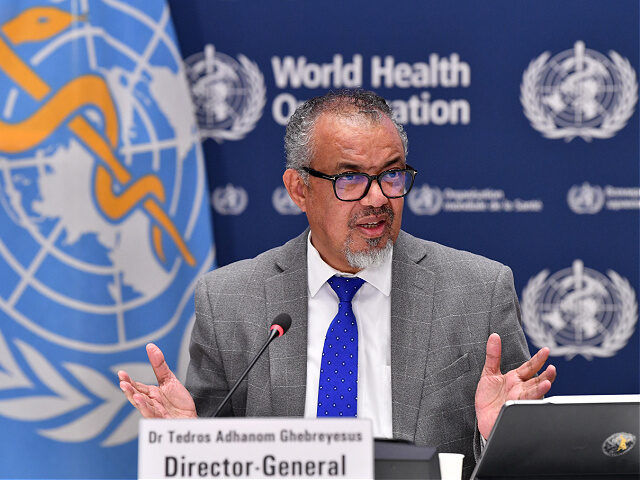The World Health Organization (W.H.O.) launched a campaign on Thursday urging the world to invest $1.5 billion into its emergency fund – a separate pool of money from its regular operations funding intended to address health crises around the world.
W.H.O. Director-General Tedros Adhanom Ghebreyesus launched the campaign at a press conference on Thursday accompanied by an over 100-page brochure detailing the various global health emergencies the W.H.O. intends to address, focusing heavily on the collapse of a functioning state in Afghanistan, poor conditions caused by Hamas terrorists exploiting health centers to hide fighters and terrorists in Gaza, and the spread of cholera, malaria, and monkeypox (mpox) in sub-Saharan Africa.
The U.N. agency predicted that it would have to address 42 health emergencies around the world in 2025.
The costly appeal follows years of bad press as a result of the W.H.O.’s poor performance under Director-General Tedros. The W.H.O. was at the forefront of efforts in early 2020 to assure global observers that the highly contagious novel coronavirus originating in Wuhan, China, was not capable of “human-to-human transmission” and later published a report on the origins of the virus so lacking in clarity that Tedros himself condemned it. Scores of women in the Democratic Republic of Congo (DRC) have accused W.H.O. staffers of raping them for forcing them to have sex for much-needed jobs or other humanitarian needs. In 2023, the W.H.O. paid some of the victims $250 and offered them baking classes.
Tedros obtained a second term at the helm of the world’s largest public health body in 2022 in an election in which he ran unopposed.
The W.H.O. emergency appeal touted the agency’s work in DRC, among other countries, as a prime reason for requesting upwards of a billion dollars in additional funding. The breakdown of how the agency expected to spend that money listed DRC as one of the least expensive crises for 2025, however, using up only about $2 million of the $1.5 billion requested.
The most expensive crisis on the list is that in Gaza, labeled as the “occupied Palestinian territory.” The W.H.O. is asking for nearly $300 million to address the situation in the war-torn area controlled by Hamas for nearly two decades.
The W.H.O. is also asking for $141 million to offer health care and other aid to Syria in the aftermath of the fall of the Assad family dynasty in December. The ongoing crisis in Sudan, it predicted, would require $135 million to address in 2025.
“The climate crisis, increasingly frequent and severe disasters, and unprecedented levels of conflict are jeopardizing health and decimating health systems, making those displaced more susceptible to disease, and disrupting lifesaving, vaccinations and care, particularly for children,” Tedros and W.H.O. Emergencies Director Michael Ryan wrote in a message accompanying the appeal.
“We are no longer moving from emergency to recovery but instead enduring rolling crises that extend across years and decades, making health services inaccessible to many,” they continued. “Yet, as the urgent need for assistance grows, the global financial landscape is shrinking, forcing us to make increasingly difficult decisions about whom we can reach and how far we can go.”
In a press conference to announce the push, Tedros insisted that health crises in the modern era were “relentless, overlapping, and intensifying.”
“Without adequate and sustainable funding we face the impossible task of deciding who will receive care and who will not,” he noted grimly.
The two branded offering funding to the W.H.O. a “powerful act of global solidarity” that could “save lives … uphold the universal right to health, and to help restore peace to communities.”
The appeal emphasized that this $1.5 billion is intended for the W.H.O. Contingency Fund for Emergencies (CFE), not the general pool of funding for the W.H.O. The CFE is distinct from general funding in that it is easier and faster to use those funds and is intended, the agency explained, to “revolutionize how public health emergencies are addressed.”
While claiming the funds will be used to address health emergencies explicitly, the appeal’s brochure repeatedly emphasizes the agency’s fixation on “climate change,” declaring it “a health crisis” itself “wreaking havoc on human health, societies, economies, and overwhelming health care systems worldwide.”
“Climate-induced disasters, including floods, droughts, and heatwaves, are intensifying disease outbreaks and worsening health inequities,” the W.H.O. claimed. “WHO leads emergency responses and builds resilience in health systems to mitigate these impacts.”
The agency also claimed the money would help in the “prevention of sexual exploitation, abuse and harassment, asserting it would fund “strengthening the prevention of, and response to, genderbased violence, including capacity-building and increased accountability within W.H.O.” This commitment did not specifically address the ongoing sexual abuse scandal in DRC.
The W.H.O.’s appeal arrived less than a week before the United States, one of the W.H.O.’s most generous donors historically, welcomes President-elect Donald Trump into the White House once again. Trump famously cut funding and withdrew from the agency in 2020 in response to its catastrophic handling of the Wuhan coronavirus pandemic, declaring that the W.H.O. “failed in its basic duty and it must be held accountable.”
Outgoing President Joe Biden reintegrated America into the W.H.O. and restored funding. Multiple reports following Trump’s election in November indicated that the president-elect is planning to withdraw from the W.H.O. “immediately” after taking office.

COMMENTS
Please let us know if you're having issues with commenting.